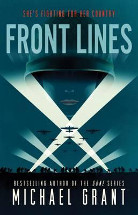Interview with Michael Grant

Bestselling YA author Michael Grant is in Australia and New
Zealand to promote Front
Lines, the first book in his blockbuster new YA
series, Soldier Girl .
Welcome to ReadPlus, Michael.
Q: Do you write with a particular audience in mind?
A: I have had the great advantage as a writer of having paid my dues
down in the trenches, by which I mean writing work-for-hire jobs for
packagers. Packagers are middle-men who manage long-running series,
or at least that's what they were when we (my wife Katherine and I)
worked for them.
So, long before I sat down to write books that were purely mine (or
ours) I'd co-authored something like seventeen Sweet Valley
Twins, a bunch of Girl Talk books, all kinds of Disney
projects involving Mermaid, Aladdin, Duck and
Mouse and a bunch more stuff I barely remember.
All of that happened before Katherine and I sort of declared our
independence from packagers with Animorphs. Animorphs
was huge. It ended up running to 60 books, with more than 30 million
sold. So we were 'overnight sensations' who'd already written 50 or
so books.
Animorphs was the first time Katherine and I had complete
control, so we had to think about the potential readers. We had a
lot of experience but still, we collected all the scientific
evidence we could find, summoned experts, and. . . Nah, none of
that. Our idea of the audience was, 'Whoever reads Goosebumps.'
On the theory that, 'That's a lot of kids.'
Many people have, over the years, written about how dark and
disturbing Animorphs was, how it snuck in philosophical
themes and moral gray zones and frequently questionable heroes.
Nothing about Animorphs was age-appropriate. It was a dark
concept, and being true to character and story took us to dark
places. So we went.
We didn't care then about 'appropriate,' and I don't care now. The
notion that Kid X at age Y can read A but not B, is bizarre to me.
Don't we all want kids to read? Do we think the best way to
accomplish that goal is by snatching the books that interest them
out of their hands? Kid X can and should read whatever Kid X wants
to read. If it's too much, Kid X will stop and go read something
else.
When I was 9 years old I was reading Ivanhoe and Oliver
Twist and Hardy Boys and Tom Swift and my
dad's Playboys and I turned out. . . well, okay, bad
example. But these are books not heroin. This is a good addiction.
We all want people of all ages reading, right? So, let's let them do
that.
As to whether I'm writing for male or female readers my first
reaction is puzzlement. I mean, I'm a guy but I read Little
Women when I was a kid. I don't recall feeling any less
masculine as a result. I read Nancy Drew, too, along with Hardy
Boys and Tom Swift and classics like Ivanhoe
or Oliver Twist. Was I not supposed to read Anna
Karenina because it's about a girl? Did I breach gender
protocol by reading Jane Austen and the Bronte sisters?
You know Frankenstein? Written by a woman. So. . . girl
book?
I mean, other than as a marketing concept, what does any of that boy
book, girl book thing even mean? The rough working definition of
Young Adult literature is: books where major characters are under
the legal drinking age. But I think even drawing sharp lines there
is wrong, let alone further subdividing by gender. 'They kiss.' Girl
Book! 'They explode.' Boy book! Really?
I feel sometimes a need to check my calendar to make sure I haven't
fallen into a wormhole and re-emerged in the 1970's.
Look, I've written or co-written 150 plus books. From Animorphs
and Gone and BZRK I've gotten letters from readers
thanking me for exactly the stuff that some would have called
inappropriate. I've lost track of how many now-grown readers have
written to say that because of Animorphs they became human
rights lawyers or scientists. Thousands of letters and Tweets saying
I used to hate to read, then I found Gone. You know what
letter I've never gotten? The one that says I was traumatized by
your books. Or the one that says, I'm a boy and I was horrified to
discover there are girls in your books.
Basically, when I write I have a story to tell. I have characters. I
will be true to my characters and my story and if the results are
not quite right for this demographic niche or that slice of
audience, well, too bad, I guess. They can go read some other book.
Do I write for girls? For boys? For parents? For teachers? For
homeless people who pick my book out of a trash bin? Yes. And also,
no. Because while I'd love everyone to read every single word I ever
write, (I believe that's the Fifth Circle of Dante's Hell) I'm not
writing for anyone. I'm not even writing for myself. I'm telling a
story I made up, about some people I made up, because I like doing
that, and they pay me.